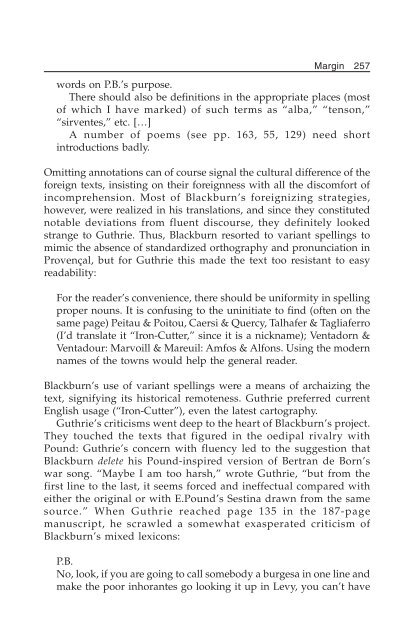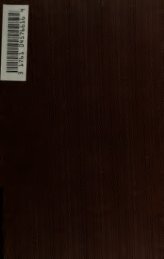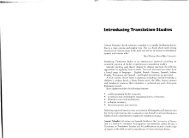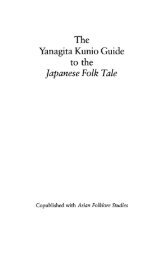- Page 2 and 3:
The Translator’s Invisibility The
- Page 4 and 5:
The Translator’s Invisibility A H
- Page 6:
Contents General editors’ preface
- Page 9 and 10:
viii General editors’ preface con
- Page 11 and 12:
x Preface and acknowledgements Maul
- Page 13 and 14:
xii Preface and acknowledgements 5
- Page 15 and 16:
2 The Translator’s Invisibility m
- Page 17 and 18:
4 The Translator’s Invisibility
- Page 19 and 20:
6 The Translator’s Invisibility
- Page 21 and 22:
8 The Translator’s Invisibility a
- Page 23 and 24:
10 The Translator’s Invisibility
- Page 25 and 26:
12 The Translator’s Invisibility
- Page 27 and 28:
14 The Translator’s Invisibility
- Page 29 and 30:
16 The Translator’s Invisibility
- Page 31 and 32:
18 The Translator’s Invisibility
- Page 33 and 34:
20 The Translator’s Invisibility
- Page 35 and 36:
22 The Translator’s Invisibility
- Page 37 and 38:
24 The Translator’s Invisibility
- Page 39 and 40:
26 The Translator’s Invisibility
- Page 41 and 42:
28 The Translator’s Invisibility
- Page 43 and 44:
30 The Translator’s Invisibility
- Page 45 and 46:
32 The Translator’s Invisibility
- Page 47 and 48:
34 The Translator’s Invisibility
- Page 49 and 50:
36 The Translator’s Invisibility
- Page 51 and 52:
38 The Translator’s Invisibility
- Page 53 and 54:
40 The Translator’s Invisibility
- Page 55 and 56:
42 The Translator’s Invisibility
- Page 57 and 58:
44 The Translator’s Invisibility
- Page 59 and 60:
46 The Translator’s Invisibility
- Page 61 and 62:
48 The Translator’s Invisibility
- Page 63 and 64:
50 The Translator’s Invisibility
- Page 65 and 66:
52 The Translator’s Invisibility
- Page 67 and 68:
54 The Translator’s Invisibility
- Page 69 and 70:
56 The Translator’s Invisibility
- Page 71 and 72:
58 The Translator’s Invisibility
- Page 73 and 74:
60 The Translator’s Invisibility
- Page 75 and 76:
62 The Translator’s Invisibility
- Page 77 and 78:
64 The Translator’s Invisibility
- Page 79 and 80:
66 The Translator’s Invisibility
- Page 81 and 82:
68 The Translator’s Invisibility
- Page 83 and 84:
70 The Translator’s Invisibility
- Page 85 and 86:
72 The Translator’s Invisibility
- Page 87 and 88:
74 The Translator’s Invisibility
- Page 89 and 90:
76 The Translator’s Invisibility
- Page 91 and 92:
78 The Translator’s Invisibility
- Page 93 and 94:
80 The Translator’s Invisibility
- Page 95 and 96:
82 The Translator’s Invisibility
- Page 97 and 98:
84 The Translator’s Invisibility
- Page 99 and 100:
86 The Translator’s Invisibility
- Page 101 and 102:
88 The Translator’s Invisibility
- Page 103 and 104:
90 The Translator’s Invisibility
- Page 105 and 106:
92 The Translator’s Invisibility
- Page 107 and 108:
94 The Translator’s Invisibility
- Page 109 and 110:
96 The Translator’s Invisibility
- Page 111 and 112:
98 The Translator’s Invisibility
- Page 113 and 114:
100 The Translator’s Invisibility
- Page 115 and 116:
102 The Translator’s Invisibility
- Page 117 and 118:
104 The Translator’s Invisibility
- Page 119 and 120:
106 The Translator’s Invisibility
- Page 121 and 122:
108 The Translator’s Invisibility
- Page 123 and 124:
110 The Translator’s Invisibility
- Page 125 and 126:
112 The Translator’s Invisibility
- Page 127 and 128:
114 The Translator’s Invisibility
- Page 129 and 130:
116 The Translator’s Invisibility
- Page 131 and 132:
118 The Translator’s Invisibility
- Page 133 and 134:
120 The Translator’s Invisibility
- Page 135 and 136:
122 The Translator’s Invisibility
- Page 137 and 138:
124 The Translator’s Invisibility
- Page 139 and 140:
126 The Translator’s Invisibility
- Page 141 and 142:
128 The Translator’s Invisibility
- Page 143 and 144:
130 The Translator’s Invisibility
- Page 145 and 146:
132 The Translator’s Invisibility
- Page 147 and 148:
134 The Translator’s Invisibility
- Page 149 and 150:
136 The Translator’s Invisibility
- Page 151 and 152:
138 The Translator’s Invisibility
- Page 153 and 154:
140 The Translator’s Invisibility
- Page 155 and 156:
142 The Translator’s Invisibility
- Page 157 and 158:
144 The Translator’s Invisibility
- Page 159 and 160:
146 The Translator’s Invisibility
- Page 161 and 162:
Chapter 4 Dissidence The fundamenta
- Page 163 and 164:
150 The Translator’s Invisibility
- Page 165 and 166:
152 The Translator’s Invisibility
- Page 167 and 168:
154 The Translator’s Invisibility
- Page 169 and 170:
156 The Translator’s Invisibility
- Page 171 and 172:
158 The Translator’s Invisibility
- Page 173 and 174:
160 The Translator’s Invisibility
- Page 175 and 176:
162 The Translator’s Invisibility
- Page 177 and 178:
164 The Translator’s Invisibility
- Page 179 and 180:
166 The Translator’s Invisibility
- Page 181 and 182:
168 The Translator’s Invisibility
- Page 183 and 184:
170 The Translator’s Invisibility
- Page 185 and 186:
172 The Translator’s Invisibility
- Page 187 and 188:
174 The Translator’s Invisibility
- Page 189 and 190:
176 The Translator’s Invisibility
- Page 191 and 192:
178 The Translator’s Invisibility
- Page 193 and 194:
180 The Translator’s Invisibility
- Page 195 and 196:
182 The Translator’s Invisibility
- Page 197 and 198:
184 The Translator’s Invisibility
- Page 199 and 200:
186 The Translator’s Invisibility
- Page 201 and 202:
188 The Translator’s Invisibility
- Page 203 and 204:
190 The Translator’s Invisibility
- Page 205 and 206:
192 The Translator’s Invisibility
- Page 207 and 208:
194 The Translator’s Invisibility
- Page 209 and 210:
196 The Translator’s Invisibility
- Page 211 and 212:
198 The Translator’s Invisibility
- Page 213 and 214:
200 The Translator’s Invisibility
- Page 215 and 216:
202 The Translator’s Invisibility
- Page 217 and 218:
204 The Translator’s Invisibility
- Page 219 and 220: 206 The Translator’s Invisibility
- Page 221 and 222: 208 The Translator’s Invisibility
- Page 223 and 224: 210 The Translator’s Invisibility
- Page 225 and 226: 212 The Translator’s Invisibility
- Page 227 and 228: 214 The Translator’s Invisibility
- Page 229 and 230: 216 The Translator’s Invisibility
- Page 231 and 232: 218 The Translator’s Invisibility
- Page 233 and 234: 220 The Translator’s Invisibility
- Page 235 and 236: 222 The Translator’s Invisibility
- Page 237 and 238: 224 The Translator’s Invisibility
- Page 239 and 240: 226 The Translator’s Invisibility
- Page 241 and 242: 228 The Translator’s Invisibility
- Page 243 and 244: 230 The Translator’s Invisibility
- Page 245 and 246: 232 The Translator’s Invisibility
- Page 247 and 248: 234 The Translator’s Invisibility
- Page 249 and 250: 236 The Translator’s Invisibility
- Page 251 and 252: 238 The Translator’s Invisibility
- Page 253 and 254: 240 The Translator’s Invisibility
- Page 255 and 256: 242 The Translator’s Invisibility
- Page 257 and 258: 244 The Translator’s Invisibility
- Page 259 and 260: 246 The Translator’s Invisibility
- Page 261 and 262: 248 The Translator’s Invisibility
- Page 263 and 264: 250 The Translator’s Invisibility
- Page 265 and 266: 252 The Translator’s Invisibility
- Page 267 and 268: 254 The Translator’s Invisibility
- Page 269: 256 The Translator’s Invisibility
- Page 273 and 274: 260 The Translator’s Invisibility
- Page 275 and 276: 262 The Translator’s Invisibility
- Page 277 and 278: 264 The Translator’s Invisibility
- Page 279 and 280: 266 The Translator’s Invisibility
- Page 281 and 282: 268 The Translator’s Invisibility
- Page 283 and 284: 270 The Translator’s Invisibility
- Page 285 and 286: 272 The Translator’s Invisibility
- Page 287 and 288: 274 The Translator’s Invisibility
- Page 289 and 290: 276 The Translator’s Invisibility
- Page 291 and 292: 278 The Translator’s Invisibility
- Page 293 and 294: 280 The Translator’s Invisibility
- Page 295 and 296: 282 The Translator’s Invisibility
- Page 297 and 298: 284 The Translator’s Invisibility
- Page 299 and 300: 286 The Translator’s Invisibility
- Page 301 and 302: 288 The Translator’s Invisibility
- Page 303 and 304: 290 The Translator’s Invisibility
- Page 305 and 306: 292 The Translator’s Invisibility
- Page 307 and 308: 294 The Translator’s Invisibility
- Page 309 and 310: 296 The Translator’s Invisibility
- Page 311 and 312: 298 The Translator’s Invisibility
- Page 313 and 314: 300 The Translator’s Invisibility
- Page 315 and 316: 302 The Translator’s Invisibility
- Page 317 and 318: 304 The Translator’s Invisibility
- Page 319 and 320: 306 The Translator’s Invisibility
- Page 321 and 322:
308 The Translator’s Invisibility
- Page 323 and 324:
310 The Translator’s Invisibility
- Page 325 and 326:
312 The Translator’s Invisibility
- Page 327 and 328:
Notes 1 Invisibility 1 These cultur
- Page 329 and 330:
316 Notes not so much “the immedi
- Page 331 and 332:
318 Notes 2 Sheehan 1989:157-158 de
- Page 333 and 334:
320 Notes 4 Dissidence 1 My concept
- Page 335 and 336:
322 Notes Cavalcanti and Daniel ver
- Page 337 and 338:
Bibliography Abrams, M.H. (1953) Th
- Page 339 and 340:
326 Bibliography —(1962) “The I
- Page 341 and 342:
328 Bibliography —(1969) Cronopio
- Page 343 and 344:
330 Bibliography Feldman, R. and Sw
- Page 345 and 346:
332 Bibliography Hager, A. “Briti
- Page 347 and 348:
334 Bibliography Latham, W. (trans.
- Page 349 and 350:
336 Bibliography —(1984b) Otherwi
- Page 351 and 352:
338 Bibliography Parsons, A.E. (192
- Page 353 and 354:
340 Bibliography Ross, A. (1989) No
- Page 355 and 356:
342 Bibliography —(1983b) British
- Page 357 and 358:
344 Bibliography Zanzotto, A. (1975
- Page 359 and 360:
346 Index Kennerbuch” 228-30; “
- Page 361 and 362:
348 Index Everyman’s Library 140
- Page 363 and 364:
350 Index Meleagros 209 Mellor, A.
- Page 365 and 366:
352 Index Scheler, M. 303 Schelling







